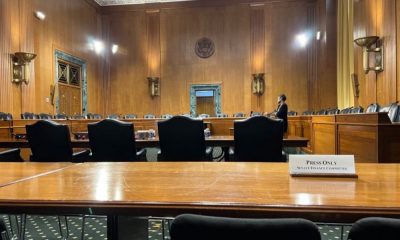Television
FALL ARTS 2018 TV: ‘Insatiable,’ ‘Insecure’ and a ton of reboots
Billy Porter joins AHS, ‘Will & Grace’ returns and Roseanne dies
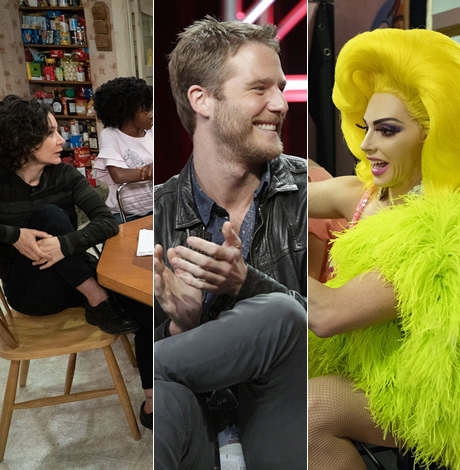
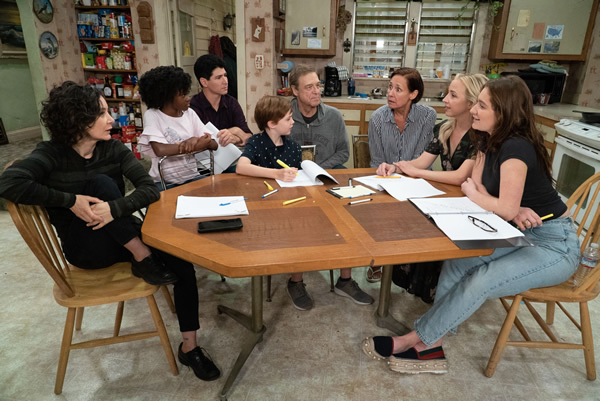
The cast of ‘The Conners’ sans Roseanne. (Photo courtesy ABC)
Now that new shows and new seasons premiere throughout the year, the falls television season has lost some of its luster. Nevertheless, there are some great offerings on their way, including LGBT fan favorites and series with interesting queer content.
Here is a sample of the shows on their way this fall, based on the latest information available. Schedules are subject to change, so check your local listings.
Four queer series have already hit the small screen. “Insatiable” (Netflix) premiered Aug. 10. Focusing on a teenaged girl who wants to get revenge on her bullies, the show includes several LGB characters. The third season of “Insecure” (HBO) dropped Aug. 12 and the show has already been picked up for a fourth season. Based on conversations with fans and writers after a male character revealed that he once had sex with a man, showrunner Issa Rae says she is ready to tackle LGBT issues in the show.
“The Deuce,” starring James Franco and Maggie Gyllenhaal, returned to HBO Sept. 9. The action has jumped forward five years to 1977 and gay bartender Paul is becoming part of the burgeoning gay bar scene.
The eighth season of “American Horror Story” began on FX Sept. 12. Subtitled “Apocalypse,” the show is a crossover between “Murder House” (season one) and “Coven” (season there). The new season will combine characters, themes and plot elements from both seasons. All of the major cast members will return, with some of the actors playing multiple characters. Joining the cast will be Joan Collins (the original “Dynasty”) and Billy Porter (“Pose”).
“9-1-1” returns to FOX Sept. 23 for its second season. Angela Bassett plays LAPD police sergeant Athena Grant, whose husband Michael has come out as gay. Aisha Hinds plays out firefighter “Hen” Wilson and Tracie Thoms plays her wife Karen Wilson.
Anchored by openly gay Jim Parsons as super-nerd Sheldon Cooper, “The Big Bang Theory” will begin its final season on CBS Sept. 25.
The popular tear-jerker “This Is Us,” which has been hailed for its sensitive handling of race and sexuality, returns to NBC Sept. 25. During the first two seasons, Randall Pearson (played by Emmy-winning actor Sterling K. Brown), is reunited with his bisexual biological father William “Shakespeare” Hill (Ron Cephas Jones). William introduces the family to his ex-boyfriend Jessie (Denis O’Hare) before his death from cancer. In flashbacks, William (played by Jermel Nakia) abandons his infant son at a firehouse following the death of his girlfriend. It’s not clear how the chronologically flexible show will handle the bisexual storyline in season three or if creator Dan Fogelman will add additional LGBT plotlines.
Starring Jesse Tyler Ferguson and Eric Stonestreet as a gay couple, ABC’s “Modern Family” returns for its 10th and final season Sept. 25. The producers have announced that there will be a spin-off, but casting for the new show has not been announced.
Under the watchful and wildly inventive eye of openly gay creator Lee Daniels, the cross-over series “Empire” and “Star” return to Fox Sept. 26. Both shows feature prominent African-American LGBT characters. Trans actress Amiyah Scott plays Cotton, the trans daughter of salon owner Carlotta Brown (Queen Latifah).
Twenty years after the original series went off the air, the revival of “Murphy Brown” returns to CBS Sept. 27. Candice Bergen returns as the infamous title character, rejoined by Faith Ford (Corky Sherwood), Joe Regalbuto (Frank Fontana) and Grant Shoud (Miles Silverberg). Jake McDorman joins the cast as Murphy’s son Avery, a journalist who shares his mother’s quick wit and competitive spirit, and Nik Dodani plays the social media director for “Murphy in the Morning.” The gang still hangs out at legendary watering hole Phil’s, now under the management of Phil’s sister Phyllis (Tyne Daly).
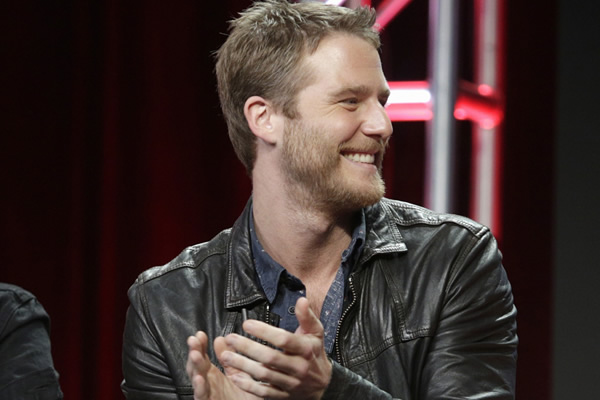
Jake McDorman as Murphy’s son on the ‘Murphy Brown’ reboot. (Photo by Francis Specker; courtesy CBS)
The award-winning “How to Get Away with Murder” returns to ABC Sept. 27 for a fifth season. Viola Davis stars as pansexual law school professor Annalise Keating and the show includes several other LGBT characters.
Openly gay actor Leslie Jordan is part of the cast of the new show “The Cool Kids” which premieres on Fox Sept. 28. Set in a retirement home, the show also stars camp icon Vicki Lawrence (“Mama’s Family” and “The Carol Burnett Show”), David Alan Grier (“In Living Color”) and Martin Mull (“Roseanne”).
The popular revival of “Will & Grace” returns to NBC Oct. 4 for its second season (10th total); the show has already been renewed for an 11th season. Out actor Matt Bomer joins the cast as a new love interest for Will (Eric McCormack) and David Schwimmer (“Friends”) joins the cast as a love interest for Grace (Debra Messing). Minnie Driver returns as Lorraine Finster, the scheming stepdaughter of Karen (Megan Mullally) and Brian Jordan Alvarez returns as Estafan, the flight attendant boyfriend of Jack (Sean Hayes).
In addition, Chelsea Handler joins the cast as Donna Zimmer, a high-powered client of Grace’s who falls for Grace’s bitter sister Janet Adler (Mary McCormack). Blythe Danner, Robert Klein and Alec Baldwin return as guest stars and there will be cameo appearances from Jon Cryer and Olympic medal-nabbing gay figure skater Adam Rippon.
Directly following the season premiere of “Will & Grace,” “Superstore” will return to NBC for its fourth season. The ensemble cast of workers at the fictional big-box store “Cloud 9” includes openly gay Filipino actor Nico Santos (“Crazy Rich Asians”) as an openly gay Filipino store employee.
The multi-talented, multi-layered and very modest Justin Johnson, aka drag superstar Alyssa Edwards (a “RuPaul’s Drag Race” vet), stars in “Dancing Queen” which drops Oct. 5. Set in Johnson’s hometown of Mesquite, Texas, the Netflix docu-series follows the performer as he balances his dance life, his drag life, his family life and his love life and prepares his young students at the Beyond Belief Dance Company for competition.
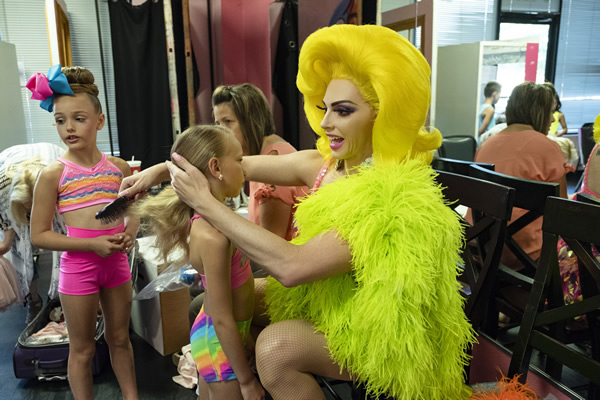
Alyssa Edwards in ‘Dancing Queen.’ (Photo by Jake Giles Netter; courtesy Netflix)
During the first weeks of October, the very queer friendly CW network will drop several new and returning shows, including the final season of “Crazy Ex-Girlfriend,” a reboot of the cult favorite “Charmed,” the second season of the rebooted “Dynasty,” “Riverdale,” “Black Lightning” and three of the series set in the DC Arrowverse: “Supergirl,” “Arrow” and “The Flash.”
In the wake of actress Roseanne Barr’s Twitter meltdown and the cancellation of the revival of “Roseanne,” ABC has killed off her character. The rest of the family will be reunited in “The Conners” which premieres Oct. 16. Beyond Darlene’s gender non-conforming son Mark (Ames McNamara), it is unclear which of the original series’ LGBT characters will return.
In the wake of allegations of sexual misconduct, Netflix fired Kevin Spacey from “House of Cards,” where he played bisexual former President Frank Underwood. The sixth and final season will premiere without Spacey on Nov. 2. A recently released trailer shows President Claire Underwood (Robin Wright) standing over her husband’s grave.
GLAAD has hailed several daytime dramas for their LGBT storylines. Some on the ongoing soaps include “The Bold and the Beautiful,” “The Young and the Restless,” “Days of Our Lives” and “General Hospital.”
Finally, several series that with queer characters or with a strong LGBT fanbase are expected to return this fall, even though premiere days have not been announced. These include “The Marvelous Mrs. Maisel,” Dear White People” and “Transparent.”
Television
Lesbian road movie returns with campy ‘Dolls’
A retro-inspired, neon-lit road trip/neo-noir thriller
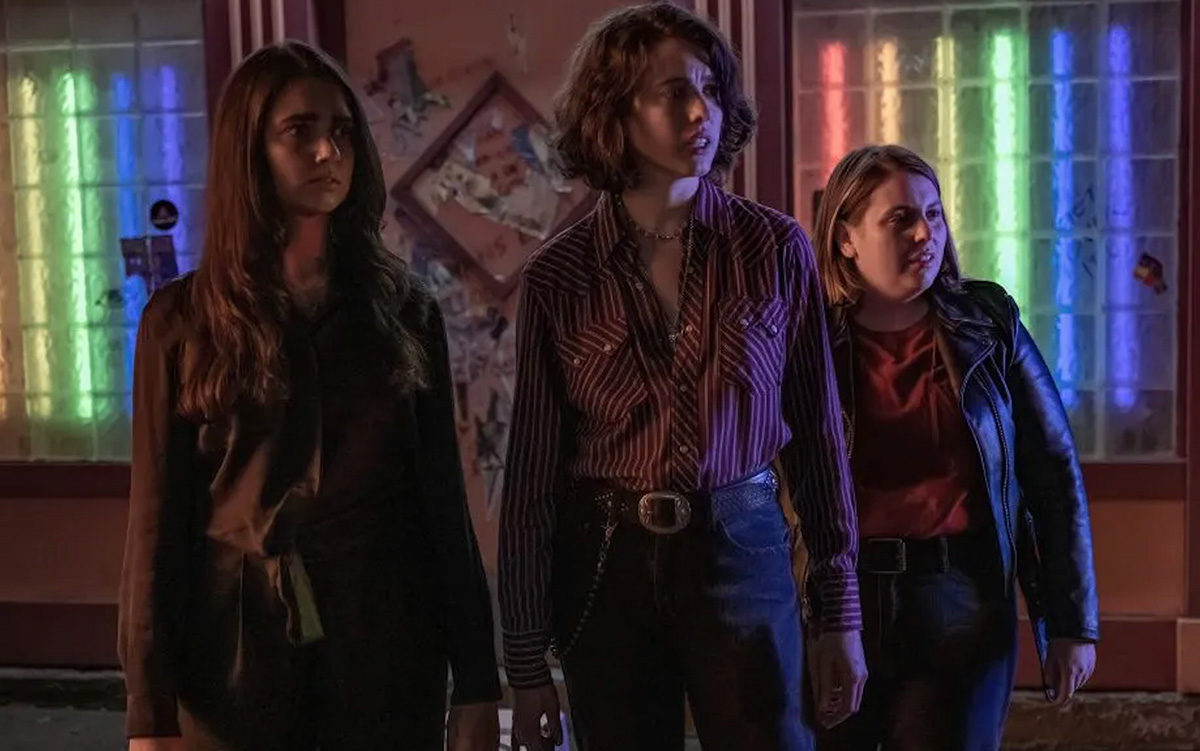
Let’s admit it: by the time Hollywood’s awards season draws to a close, most of us are more than ready for a good mindless “B movie” to cleanse our palettes. After the glut of “serious” and “important” films dominating the public conversation, it’s just incredibly freeing to watch something that feels — at some level, at least — more like entertainment than it does like doing homework.
That’s one of the biggest reasons why the timing of “Drive-Away Dolls,” which hit screens on Feb. 23, feels like a really savvy move, especially since it comes from a major Hollywood studio and boasts a multi-Oscar-winning director – Ethan Coen, who alongside brother Joel is half of one of Hollywood’s most prodigious filmmaking teams – at its helm. A retro-inspired and neon-lit road trip/chick flick/neo-noir thriller featuring lesbian leading characters and leaning hard into the visual palette of the ‘70s-era exploitation drive-in movie fodder it aims to both emulate and reinvent, it lays no claim to lofty purpose or intellectual conceit; instead, it takes its audience on an unabashedly raunchy 1999-set wild ride in which a pair of mismatched adventurers find themselves unwittingly entangled in a caper involving a mysterious briefcase and the eccentric trio of thugs tasked with tracking it down. It tells the kind of story we expect to be able to check our brains at the door for, and just sit back to enjoy the mindless thrills.
In this case, that story centers on two young queer Philadelphia women – free-spirited sexual adventurer Jamie (Margaret Qualley), whose infidelity has tanked her relationship with girlfriend Suki (Beanie Feldstein), and square peg Marian (Geraldine Viswanathan), whose discomfort with the hedonistic social scene of big city lesbian life has her longing for the simpler pleasures of her childhood home in Tallahassee – who embark on a road trip together to Florida in search of new beginnings. It’s clear from the start that they’re at cross purposes; Jamie sees the trip as an opportunity to “loosen up” her uptight friend, while Marian just wants to get back to where she once belonged. Unbeknownst to either, however, a shady cadre of operatives (Colman Domingo, Joey Slotnick, C.J. Wilson) is on their trail, thanks to something hidden in the trunk of their rental car, and their journey is about to take a detour into unexpectedly dangerous territory.
As a premise, it’s not hard to see close parallels to many of the themes one often finds running throughout the Coen Brothers’ films; the quirky trappings of its crime story plot, the granular focus on the behavioral oddities of its characters, the whimsical (if often pointed) irony it deploys for narrative effect – all these and more give Ethan’s first “solo flight” without collaboration from his brother the kind of familiarity for audiences one can only get from four decades of previous exposure. Yet while “Drive-Away Dolls” might bear a lot of the trademark Coen touches, it’s also distinctively its own creature, with a more radical stylistic approach that one might glimpse in more flamboyant outliers to their joint filmography like “The Hudsucker Proxy” or cult-favorite “The Big Lebowski,” but which here brings its heightened sense of absurdity to the forefront in service of a story which is about, as much as it is anything, the role of causality in determining the circumstances and outcomes of our lives. In other words, it’s a movie which drives home (no pun intended) the point that – at least sometimes – our paths are determined by fate, no matter how much control we think we exert.
If you’re thinking that all this analysis doesn’t quite fit for a movie that presents itself as a madcap escapist romp, you’re not wrong; in spite of its ostensible B movie appeal, Coen’s movie – co-written with his wife, Tricia Cook – evokes some pretty weighty reflections, and while that might lend a more elevated layer to the film’s proceedings than we expect, it’s not necessarily a bad thing. We can be entertained and enlightened at the same time, after all.
Perhaps more detrimental to the movie’s effect, unfortunately, is its intricately-conceived plotting. Weaving together seemingly coincidental or irrelevant details into a chain of events that propels the story at every juncture, Coen and Cooke’s screenplay feels more devoted to cleverness than authenticity; outlandish plot twists pile up, under the guise of some esoteric cosmic significance, until they threaten to collapse in on themselves; in the end, for many viewers, it might all seem just a little too forced to be believable.
Fortunately, there are things to counterbalance that sense of overthinking that seems to permeate the script, most vital of which is the movie’s unambivalent embrace of its queer narrative. While it may borrow the familiar lesbians-on-the-run road tropes queer audiences have known for decades, it presents them in a story refreshingly devoid of shame or stigma; the sexuality of its heroines is something to be explored with nuance rather than subjected to the fetishized bias of the so-called “male gaze,” and it succeeds in giving us “tastefully” explicit scenes of same sex love that celebrate the joy of human connection rather than turning it into a voyeuristic spectacle. Even more important, perhaps, “Drive-Away Dolls” omits one particularly toxic cliché of queer stories on film by refuising to make its queer heroines into victims; they’re way too smart for that, and it makes us like them all the more, even if we don’t quite find ourselves absorbed in their story.
For this, full credit must go to Qualley and Viswanathan, who individually build fully relatable and multi-dimensional characters while also finding a sweet and believable chemistry within the awkwardness of finding a romantic love story between two friends – a complex species of relationship that surely deserves a more extensive and nuanced treatment than it gets space for in Coen’s film. As good as they are, though, it’s Feldstein’s relatively small supporting turn that steals the movie, with an unflinching-yet-hilarious tough-as-nails performance as Qualley’s ex that both acknowledges and undercuts the stereotype of the “angry lesbian” while striking an immensely satisfying blow for queer female empowerment. The always-stellar Domingo underplays his way through an effectively civilized supporting performance as the chief “heavy”, and Matt Damon makes a sly cameo as a conservative politician, while daddy-of-the-decade Pedro Pascal shows up for a brief but key role that gives winking service to fans who remember him from his “Game of Thrones” days – though to say more about any of those appearances would constitute a spoiler.
“Drive-Away Dolls” has been met with mixed reviews, and this one is no exception. There’s an unmistakable good intention behind it, and much to be appreciated in its sex-positive outlook and commitment to an unapologetically queer story and characters, but while its stylistic embellishments provide for campy enjoyment, it’s ultimately diffused by its own cleverness. Still, the queer joy that frequently peeks through it is more than enough reason to say that it’s a good choice for a fun date night at the movies.
At the end of the day, what more can you ask?
Television
Watch ‘Feud,’ if you like glam and wit doused with betrayal and regret
New series focuses on Truman Capote and NYC socialites
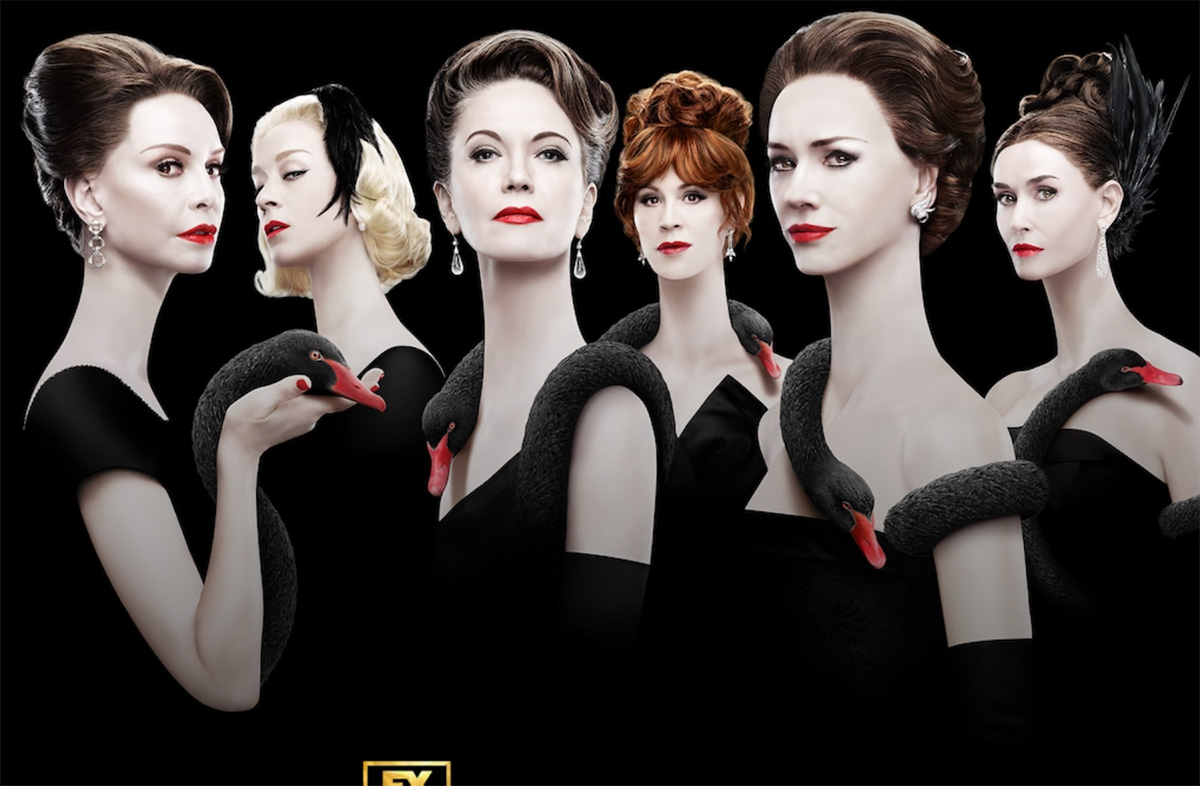
Nothing is more of a pick-me-up in the doldrums of winter than a fabulously acted, incredibly stylish feud. Complete with Champagne flutes and a splendiferous mid-century ball at New York City’s Plaza Hotel. Especially, when it’s part of the ouevre of queer TV producer and creator Ryan Murphy, whose beloved shows include “American Horror Story,” “Glee” and the anthology series “Feud.”
Season 2 of Feud, “Feud: Capote vs. The Swans,” which premiered on Jan. 31, will air weekly on FX through March 13. Episodes stream the next day on Hulu.
“Feud’s” powerhouse cast, which delivers stellar performances, includes: Tom Hollander as Truman Capote along with Naomi Watts, Diane Lane, Chloe Sevigny and Calista Flockhart as Capote’s swans.
Demi Moore plays Ann Woodward, a socialite who Capote falsely said intended to murder her husband. Molly Ringwald portrays Joanne Carson who befriended Capote when nearly no one would take him in. The role of CBS chairman Bill Paley fits the late Treat Williams like a glove.
Hollander makes Capote seem like a brilliant, flawed, cruel, sometimes kind, human being, rather than a “fairy” caricature.
Jessica Lang does a star turn as the ghost of Capote’s mother. Gus Van Sant directs most of the episodes of “Feud.”
“Feud” is based on Laurence Leamer’s book “Capote’s Women.” Playwright and screenwriter Jon Robin Baitz adapted Leamer’s book into the miniseries “Feud.”
“Feud” is the story of how acclaimed queer author Capote, after becoming their best friend betrayed his “swans.”
“The swans,” were the rich, beautiful, New York society women who confided their secrets (from their insecurities about their looks to their husbands’ infidelities) to Capote.
These “swans,” who took Capote into their inner circle, were: Babe Paley (wife of CBS chairman Bill Paley), Lee Radziwill (Jackie Kennedy’s sister), socialite Slim Keith (ex-wife of Howard Hawks and Leland Hayward) and socialite C.Z. Guest.
“You can’t blame a writer for what the characters say,” Capote, once said.
His swans didn’t agree with Capote’s dictum.
Capote’s betrayal of the swans occurred in 1975. That year, “Esquire” published “La Cote Basque, 1965,” a chapter from Capote’s much anticipated novel “Answered Prayers.”
(Capote never completed the novel. An unfinished version was published after his death.)
The “Esquire” story, set in the restaurant where Capote often lunched with his “swans,” hurt and infuriated “the ladies who lunched.” The details revealed in the “Esquire” story were so personal and thinly veiled that the “swans” felt readers would easily identify them.
“Feud” depicts the bonds of friendship that frequently exist between hetero women and queer men. Capote gave his “swans” the love and attention their spouses failed to provide. Babe Paley called Capote her “second husband.”
For Capote, an outsider because he was gay, “the swans” provided acceptance, association with high society (which he both loved and despised) and material for his writing.
Capote became estranged from the “swans” right after the “Esquire” story was published.
“Feud” goes back and forth in time. At first, this is a bit disconcerting. But, soon, it keeps things moving, and provides fascinating glimpses into Capote and the “swans.”
Bill and Babe Paley think Capote is the “other Truman” (Harry Truman) when they meet him in the 1950s.
In the 1970s, after the “swans” have shunned him, Capote is a washed-up, alcoholic, drug-addicted has-been. (Capote died in 1984 at age 59 of liver disease.)
The third episode is the stand-out of “Feud.” In 1966, Capote was at the height of his power after “In Cold Blood, his “non-fiction” novel, had been published to much acclaim and commercial success. To celebrate, Capote threw a Black and White masquerade ball. The ball, to which Capote invited 540 guests, was the most famous party of the 20th century. Katherine Graham of The Washington Post was the guest of honor.
The episode is shot as a (fictional) documentary of the ball. Shot in black and white, it’s visually stunning. We see interviews with some of the “swans,” who are ticked off, but trying not to show it, because Capote had led them to believe they would be the guest of honor.
Watch “Feud,” if you like glam, hats, white gloves, cocktails and wit doused with betrayal and regret.
Television
Rough and sexy ‘Open To It’ explores lighter side of polyamory
Take a break from prestige cinema and enjoy this new TV series
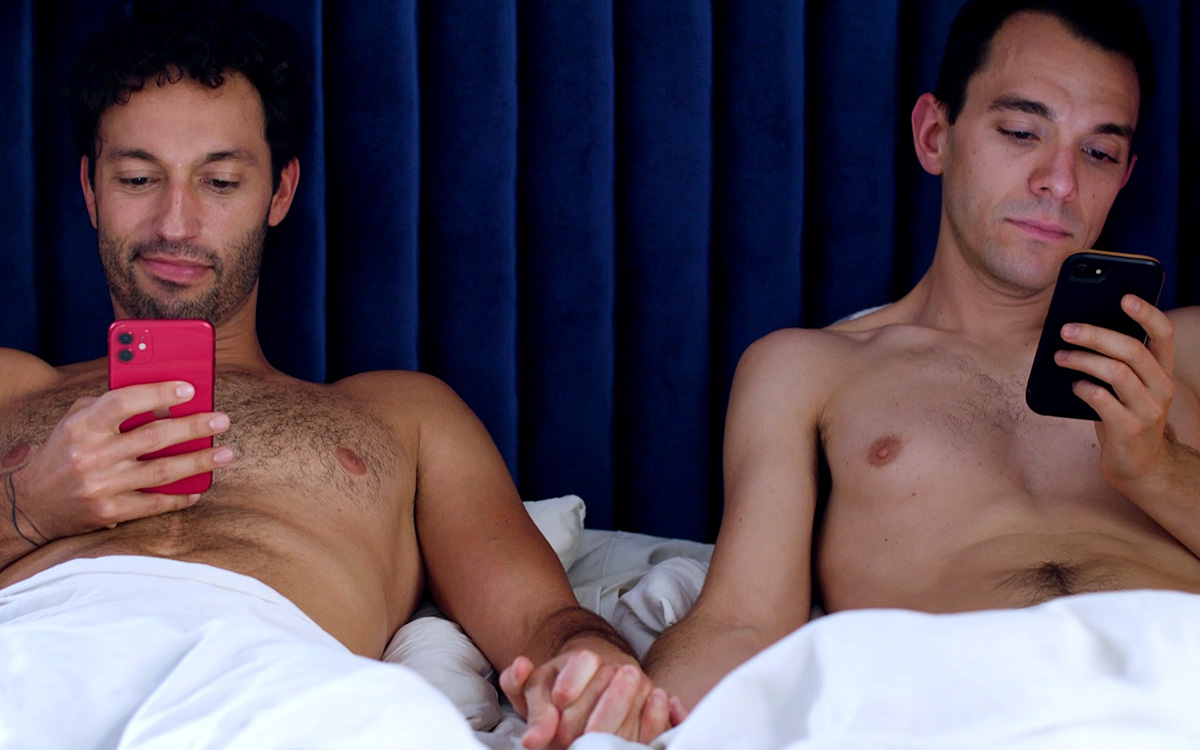
With Hollywood’s big awards season launching into full swing, January tends to be a month all about the movies – especially for people whose job it is to see them all and write about them. It’s a pleasure, of course, if you love cinema; but let’s face it, most of the award-hopeful films getting the spotlight as the new year turns tend to be pretty serious stuff. Everybody needs a break from that, once in a while.
That’s why we’re happy to take a brief pause from the whirlwind of “prestige cinema” to take a look at something that doesn’t feel quite so heavy, and the fact that it’s available in small doses on your screen-of-choice at home – via queer streaming service OutTV – makes it even more appealing. Oh, and it’s also sexy, which doesn’t hurt.
Cut from a similar cloth as some of the edgier “wacky sitcoms” enjoyed by Gen X-ers and Millennials in their younger years – but with a spicier, more diverse flavor to bridge the three-decade gap in our cultural evolution and infuse things with a more Gen-Z-friendly perspective – and assembled as a long-form narrative told in short (about 10 minutes) installments, “Open To It” is the creation of writer/actor/director Frank Arthur Smith. He stars as Greg, a previously repressed gay man now living the dream in West Hollywood as half of a loving, committed relationship with his partner, Cam (Tim Wardell). Though Cam (a self-proclaimed “former slut”) is happy to have settled into comfortable monogamy, Greg is curious to explore the more free-wheeling sexual lifestyle he denied himself in the past. The solution, of course, is for the couple to experiment with the possibility of opening up their relationship, which is where we meet them as the first episode starts: anxiously awaiting the arrival of Princeton (Jason Caceres), a sexy twink they met on Grindr and invited to join them for their first-ever threesome.
Since we already mentioned the word “wacky,” it’s probably not too hard to guess that things don’t go quite as smoothly as planned. Instead of a hot, steamy evening of pushing their sexual boundaries, the two experience a farcical disaster that, for most of us, might be considered a worst-case scenario. That, of course, establishes a formula that more or less repeats in each successive episode, as the show’s plucky lead couple determinedly keeps trying to expand into the brave new world of polyamory despite one hilariously awkward sexual debacle after another, complicated even further by the persistent Princeton, who wants more in spite of the less-than-ideal circumstances of their first encounter, and the well-meaning but intrusive couple next door (Elsa Aranda and Reggie Thomas as, respectively, a bisexual wild-child and her prudish lesbian partner), whose efforts to be supportive somehow all seem to have the opposite result. Add to this mix Cam’s overprotective Drag Mother (Laganja Estranja), and you have a recipe for queer comedy of the most chaotic kind.
Beginning its life on the film festival circuit, where the first few episodes made the rounds and became an audience favorite, “Open To It” racked up millions of online views, prompting OutTV to pick it up as a series — and affording Smith and his crew the budget to complete the rest of the season. With that in mind, it’s not a surprise that the opening handful of episodes are a little rough around the edges, though it doesn’t take long before you see the actors gaining confidence and relaxing into a natural rhythm. Even in their clunkiest moments, though, these early chapters manage to convey the blend of over-the-top (and definitely NSFW) absurd humor and cheerfully unfettered sex-positivity the show is going for with its comedy-of-errors storyline, which is enough to make us want more, and watching both the players and the characters they portray develop helps the second half of the season blossom further into itself.
In the show’s press material, Smith says his idea for the series came from his weariness over shows about queer life with “self-sabotaging protagonists” and “a downtrodden tone,” which often tended to take something of a judgmental tone about “polyamorous or otherwise non-monogamous relationships.”
“I wanted to make a sex- and relationship-positive show that normalized gay JOY,” he says. “Sexy swingers, monogamous married couples, people having a ‘50 Shades of Grey’ tie-up night — all are welcome and celebrated in the world of ‘Open To It.’”
Whether or not the series succeeds in “normalizing” anything, it certainly makes a determined effort to depict it. It’s a show about sex, centering on characters exploring their sex lives, and it’s not afraid to take us as far as broadcast standards will allow. That boils down to LOTS of sex scenes, some of them looking almost as if they could be judiciously-cropped excerpts from somebody’s OnlyFans content, which might seem more gratuitous than they are if everything else in the show felt like an excuse to show lots of sex – but, perhaps surprisingly, it doesn’t.
While the show (and its main characters, for the most part) may seem fixated on sex, its progression leads inevitably to an exploration not just of the mores and manners of a polyamorous world, but of navigating a relationship through it. And while things may seem drawn in broad, cartoonish strokes in the first episodes which have dropped since the show’s OutTV premiere on January 2, developments as the season progresses turn characters that might seem at first like stereotyped caricatures into more complex, unexpected, and refreshingly open-minded individuals, all learning – or maybe, making up – the rules as they go along.
It’s that willingness to go deeper — all while keeping things light and as near to ridiculous as possible without becoming pure anarchy — that ultimately helps “Open To It” pay off. To be sure, the writing, especially early on, sometimes borders on the clumsy and contrived, more nervous exposition than tone-setting introduction, and the tropes it embraces (more in fun than as reinforcement) about queer “types” and relationships might occasionally be off-putting to viewers looking for a more nuanced approach. Yet in the end, and in surprising ways, the show finds a way forward that promises to expand each of its queer “stock” characters — the repressed gay child acting out sexually as an adult, the too-good-to-be-true sexy-but-smart boyfriend, the tough-loving and “tea”-spilling drag queen, the opposites-attract cliché of the lesbian couple next door — into more fully fleshed-out, complex individuals.
With three more episodes in post-production, and “much more to come,” according to Smith, it appears we’ll have a chance to watch that process continue. And while it may not be the kind of slick-and-polished fare that bigger-budget streaming services use to attract queer viewers, there’s something about its raw-and-unvarnished quality that makes it feel a lot more sincere than most of them — even if it doesn’t make the cut when the next “awards season” rolls around.
-

 State Department4 days ago
State Department4 days agoState Department releases annual human rights report
-

 South America2 days ago
South America2 days agoArgentina government dismisses transgender public sector employees
-

 District of Columbia2 days ago
District of Columbia2 days agoCatching up with the asexuals and aromantics of D.C.
-

 Politics5 days ago
Politics5 days agoSmithsonian staff concerned about future of LGBTQ programming amid GOP scrutiny





